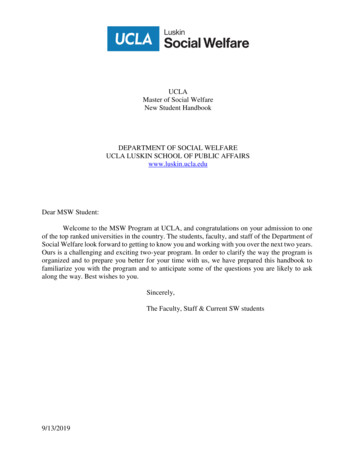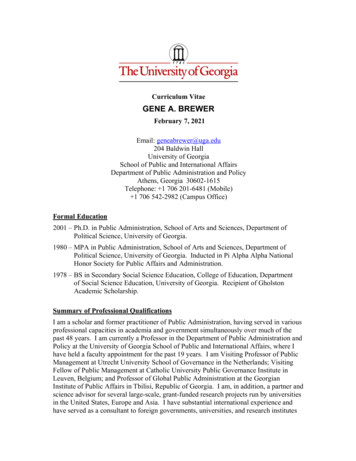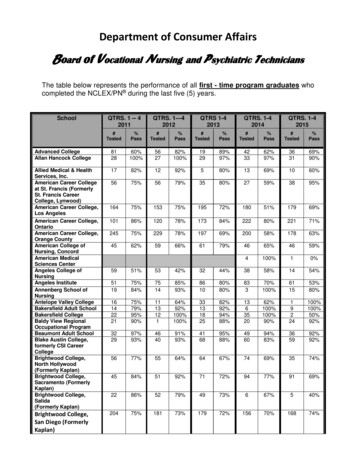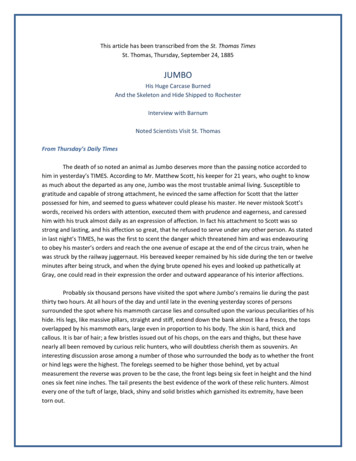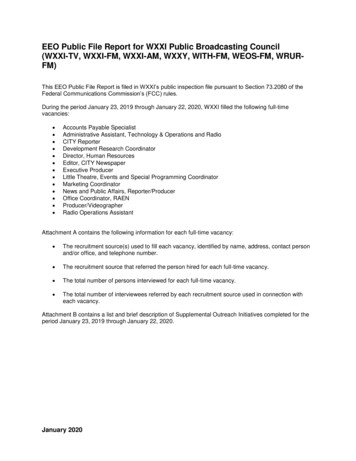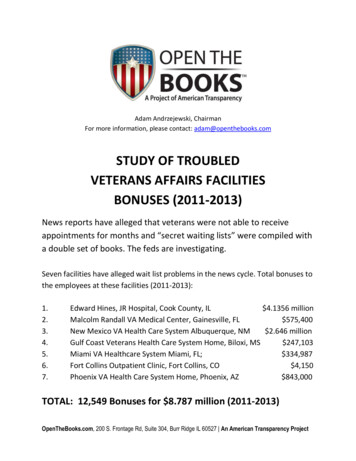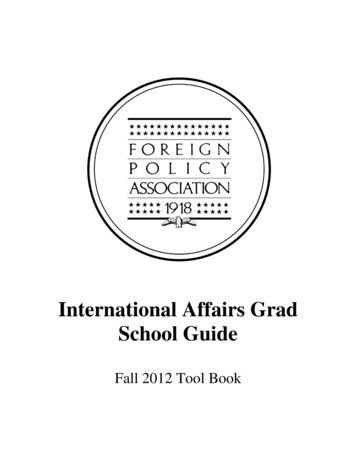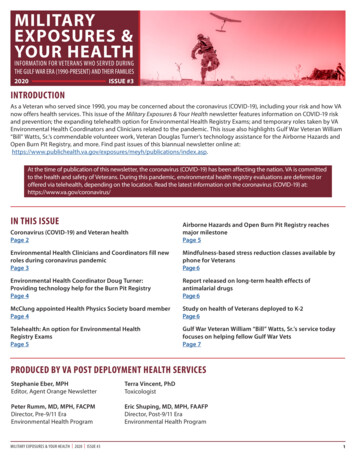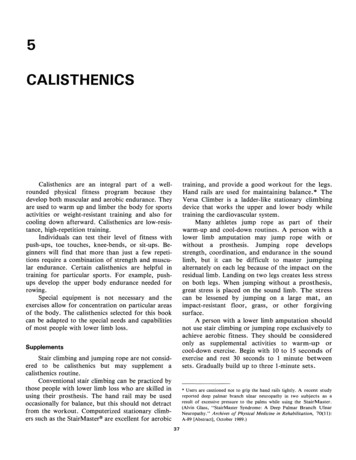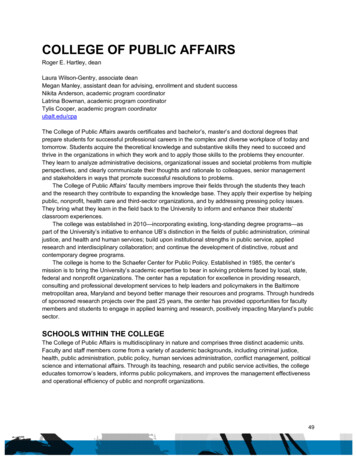
Transcription
COLLEGE OF PUBLIC AFFAIRSRoger E. Hartley, deanLaura Wilson-Gentry, associate deanMegan Manley, assistant dean for advising, enrollment and student successNikita Anderson, academic program coordinatorLatrina Bowman, academic program coordinatorTylis Cooper, academic program coordinatorubalt.edu/cpaThe College of Public Affairs awards certificates and bachelor’s, master’s and doctoral degrees thatprepare students for successful professional careers in the complex and diverse workplace of today andtomorrow. Students acquire the theoretical knowledge and substantive skills they need to succeed andthrive in the organizations in which they work and to apply those skills to the problems they encounter.They learn to analyze administrative decisions, organizational issues and societal problems from multipleperspectives, and clearly communicate their thoughts and rationale to colleagues, senior managementand stakeholders in ways that promote successful resolutions to problems.The College of Public Affairs’ faculty members improve their fields through the students they teachand the research they contribute to expanding the knowledge base. They apply their expertise by helpingpublic, nonprofit, health care and third-sector organizations, and by addressing pressing policy issues.They bring what they learn in the field back to the University to inform and enhance their students’classroom experiences.The college was established in 2010—incorporating existing, long-standing degree programs—aspart of the University’s initiative to enhance UB’s distinction in the fields of public administration, criminaljustice, and health and human services; build upon institutional strengths in public service, appliedresearch and interdisciplinary collaboration; and continue the development of distinctive, robust andcontemporary degree programs.The college is home to the Schaefer Center for Public Policy. Established in 1985, the center’smission is to bring the University’s academic expertise to bear in solving problems faced by local, state,federal and nonprofit organizations. The center has a reputation for excellence in providing research,consulting and professional development services to help leaders and policymakers in the Baltimoremetropolitan area, Maryland and beyond better manage their resources and programs. Through hundredsof sponsored research projects over the past 25 years, the center has provided opportunities for facultymembers and students to engage in applied learning and research, positively impacting Maryland’s publicsector.SCHOOLS WITHIN THE COLLEGEThe College of Public Affairs is multidisciplinary in nature and comprises three distinct academic units.Faculty and staff members come from a variety of academic backgrounds, including criminal justice,health, public administration, public policy, human services administration, conflict management, politicalscience and international affairs. Through its teaching, research and public service activities, the collegeeducates tomorrow’s leaders, informs public policymakers, and improves the management effectivenessand operational efficiency of public and nonprofit organizations.49
School of Criminal JusticeDebra Stanley, executive directorGabriela Wasileski, program director, B.S. in Criminal JusticeCharles Tumosa, program director, B.S. in Forensic Studies, Certificate in ForensicDocument Analysis and Certificate in Crime Scene InvestigationHeather Pfeifer, program director, M.S. in Criminal JusticeFrank Xu, program director, M.S. in Forensic Science–Cyber Investigations (Baltimorecampus)Nima Zahadat, program director, M.S. in Forensic Science–Cyber Investigations(Universities at Shady Grove)Patrick Hughes, program director, Public Safety Leadership CertificateWith its vibrant, urban location, the University of Baltimore is strategically positioned to take fulladvantage of its stimulating environment, promoting practical applications of its programs ofstudy. The School of Criminal Justice orients its academic priorities toward integration with thereal world, capitalizing on the very real city that acts as an extended classroom. Withcomplementary emphases on applied research, policy and administration, the School of CriminalJustice offers undergraduate programs leading to degrees in criminal justice and forensic studies,certificates in crime scene investigation and forensic document analysis, and graduate programsleading to degrees in criminal justice, forensic science–cyber investigations, and justiceleadership and management. The School of Criminal Justice also offers a graduate TraumaInformed Certificate. In collaboration with the UB School of Law, the school offers a dual-degreeJ.D./M.S. in Criminal Justice. The University was the second institution in the nation to have bothits graduate and undergraduate programs in criminal justice certified by the Academy of CriminalJustice Sciences. School of Health and Human ServicesTina DiFranco, executive directorAlan Weisman, program director, B.S. in Health ManagementAmrita Shenoy, program director, M.S. in Health AdministrationTiffaney Parkman, program director, B.A. in Human Services AdministrationBridal Pearson, program director, M.S. in Human Services AdministrationWith our nation’s health care system increasingly in the public eye and under scrutiny,management of our health and human services has never been so important. The School ofHealth and Human Services’ programs incorporate interdisciplinary, practical approaches—emphasizing in-service learning through internships and field experiences—into managing healthcare and human services in the public, private and nonprofit sectors. The school offersundergraduate programs in health management and human services administration. Anaccelerated bachelor’s/master’s option is also offered in both fields. The school offers graduateprograms in health administration and human services administration, as well as apostbaccalaureate Certificate in Health Systems Management.50
School of Public and International AffairsIvan Sascha Sheehan, executive directorLorenda Naylor, program director, B.A. in Policy, Politics and International AffairsJoseph Adler, program director, M.P.A.Ed Gibson, interim program director, M.S. in Nonprofit Management and Social EntrepreneurshipRae Tan, program director, M.S. in Negotiations and Conflict ManagementJennica Larrison, M.A. in Global Affairs and Human SecurityAaron Wachhaus, program director, D.P.A.With its abundance of government, public-sector and nonprofit organizations, the BaltimoreWashington metropolitan region is an ideal location to immerse oneself in public and internationalaffairs. The School of Public and International Affairs offers an undergraduate program leading toa degree in policy, politics, and international affairs. It also offers graduate programs leading tomaster’s degrees in public administration (accredited by the Network of Schools of Public Policy,Affairs and Administration), in negotiations and conflict management and in global affairs andhuman security, as well as a doctoral degree in public administration and both an M.P.A./J.D. orM.S. in Negotiations and Conflict Management/J.D. offered in collaboration with the UB School ofLaw.SCHAEFER CENTER FOR PUBLIC POLICYAnn Cotten, directorMary Lovegrove, assistant directorAs the preeminent public policy research center in Maryland, the Schaefer Center for Public Policy iscommitted to providing unbiased, nonpartisan research and professional development services;connecting faculty members with public-sector organizations through applied research and professionaldevelopment programs; and providing students with opportunities to apply what they learn in theclassroom to real-world challenges. The center’s principal services include program evaluation, policyresearch, strategic planning, needs assessment, staffing analysis and work force planning, opinionresearch, conflict management consulting and professional development.The center enhances the University’s academic environment by encouraging faculty and studentapplied research, fostering interdisciplinary research teams, and supporting educational conferences. Inaddition, the center offers annual graduate fellowships and student employment experiences that providestudents with unique opportunities to work closely with faculty members and researchers while gainingreal-world experience through participation in center projects.For more information, visit ubalt.edu/schaefercenter.STUDENTSThe approximately 1,200 men and women enrolled in the College of Public Affairs represent about 28percent of the total University of Baltimore student population. Nearly 60 percent of the graduate studentsenrolled in the College of Public Affairs are 30 and older, and 70 percent are women. While some of thecollege’s graduate students entered UB’s master’s degree programs immediately following theirundergraduate studies, most are already working in a wide variety of careers. Some students are seeking51
to advance their current careers, while others are preparing to change careers. This diversity of age andexperience is an important and invigorating part of classroom and campus life.FACULTYCollege of Public Affairs faculty members are leaders in teaching, research, scholarship and service tothe community. Full-time faculty members teach graduate and undergraduate courses, conductsponsored research, publish papers and articles, and engage in public service as consultants, boardmembers and volunteers. The college’s teaching faculty also includes a cadre of adjunct professors whoare leading professionals in dozens of professions in government, nonprofit organizations andbusinesses. These adjunct faculty members help to ensure that our students are well-prepared to meetthe challenges of today’s professional workplace.FACILITIESClassrooms, laboratories and faculty offices for the College of Public Affairs are located in the Liberal Artsand Policy Building, the Academic Center, and the Learning Commons. The college shares the Universityof Baltimore’s Robert L. Bogomolny Library and the Office of Technology Services with other componentsof the University.The fourth floor of the Academic Center houses the state-of-the-art Jami R. Grant ForensicLaboratories—forensics instrumentation and microscopy laboratories—with classroom space. The labswere developed to serve as overflow labs for the Baltimore Police Department.GRADUATE PROGRAMSDoctoral Program Public Administration (D.P.A.)Master’s Programs Criminal Justice (M.S.) Forensic Science–Cyber Investigations (M.S.) Global Affairs and Human Security (M.A.) Health Systems Administration Human Services Administration (M.S.) Negotiations and Conflict Management (M.S.) Nonprofit Management and Social Entrepreneurship (M.S.) Public Administration (M.P.A.)Dual-Degree Programs J.D./M.S. in Criminal Justice J.D./M.P.A. J.D./M.S. in Negotiations and Conflict ManagementGraduate Certificate Programs Certificate in Health Systems Management Trauma-Informed Certificate52
Public Safety Leadership CertificateThe graduate programs in the College of Public Affairs are designed to advance professional education,public and professional service, and basic and applied research relevant to public administration, criminaljustice, health administration and policy, and negotiations and conflict management. These graduateprograms educate and prepare students for public service careers and for research and managementpositions in federal, state and local agencies, and in health and nonprofit organizations.The College of Public Affairs also encourages students to develop specializations that combineelements of two or more master’s programs across the college and the University. For example, studentsin the M.S. in Negotiations and Conflict Management program may take courses in applied psychology,legal and ethical studies, criminal justice, management or public administration to developindividual/interpersonal, managerial/governmental or cultural/ethical perspectives.Similarly, students in the M.S. in Human Services Administration program can take courses innegotiations and conflict management, health administration, and public administration, while D.P.A.students can select specializations focusing on criminal justice, global affairs and human security, orhealth administration. Such combinations offer an exceptionally broad range of opportunities, and thecollege continues to develop formal specializations that cross and integrate the academic divisions.The M.P.A., the M.S. in Criminal Justice, and the M.S. in Negotiations and Conflict Managementprograms also offer dual-degree J.D. programs in collaboration with the UB School of Law.ADMISSIONApplicants to all programs must have received a bachelor’s degree from a regionally accredited college oruniversity and must satisfy the additional admission requirements of individual programs. Some programsadmit degree-seeking students on a conditional basis. For more information, see the Graduate Admissionsection of this catalog.Some undergraduate students in the College of Public Affairs may participate in acceleratedbachelor’s/master’s programs or take graduate courses. See the University of Baltimore UndergraduateCatalog for more information.Note: Applicants to doctoral and combined degree programs are subject to the specific admissionrequirements of those programs, as noted in their program descriptions.ACCELERATED BACHELOR’S/MASTER’S OPTIONUndergraduate students of recognized academic ability and educational maturity may fulfill the combinedrequirements of the college’s bachelor’s and master’s degrees via a variety of acceleratedbachelor’s/master’s options. This is different from applying to enroll in graduate courses as part of theundergraduate degree, as described above.This accelerated option requires a minimum of 141 credits to complete both degrees, depending on therequirements of individual programs. A maximum of 9 graduate credits, completed at the undergraduatelevel, may be applied simultaneously to the requirements for the bachelor’s and master’s degrees. Insome cases, students may cross disciplines. Those interested should discuss their proposals with theappropriate program directors.To qualify for an accelerated pathway at UB, students must have an undergraduate grade pointaverage of at least 3.5, with at least 15 credits earned at UB, and be admissible to the graduate programto which they are applying for the accelerated option. The undergraduate GPA is calculated using all53
graded collegiate credits attempted at UB and other institutions over the past five years. At least 15credits must be upper-division credits (300-level or above). Individual programs may require a certainnumber of credits to be upper-division credits in the major and for those credits to achieve a certain gradepoint average. Students should apply for the accelerated option prior to beginning the last 30 credits oftheir bachelor’s degree so that if accepted, they may attempt the graduate credits during the last 30credits of that degree. Students may not apply before they have successfully completed at least 75credits, and the grade point average for acceptance will not be calculated until at least 87 credits havebeen completed. Students interested in an accelerated option should consult with an adviser as soon aspossible.To take advantage of the option, students need to submit an application, available on the UB website,for an accelerated bachelor’s/master’s program. The application has signature areas for the approval ofthe appropriate dean and the graduate and undergraduate program directors. Students must elect to takeadvantage of the option prior to beginning the last 30 credits of their undergraduate degree.Students taking advantage of this accelerated option may register for up to 9 credits of graduatecoursework during the last 30 hours of their undergraduate degree. The undergraduate and graduateprogram directors will select the appropriate graduate courses for each student upon election of theoption. These courses may not include independent study or research, individual research, directedstudy, thesis, internship or practicum courses. Changes in the program of study require approval of boththe undergraduate and graduate program directors.Students must be in continuous enrollment at the University of Baltimore for this agreement to remainin effect. They must also maintain a 3.5 undergraduate GPA and at least a 3.0 graduate GPA. Those whofail to maintain the eligibility requirements will be dropped from the accelerated option. Applicability (ifany) of graduate courses to the undergraduate degree will be determined on an individual basis. Studentsshould be aware that graduate courses applied to both undergraduate and graduate degrees at theUniversity may not transfer as graduate credits to another institution.In addition to electing the accelerated bachelor’s/master’s option, a separate application for admissionto the graduate program (including payment of applicable fees) must be completed during the finalsemester of the bachelor’s degree program. Admission to the graduate program must be effective the firstregular semester after completing the credits required for the bachelor’s degree so that there is no breakin studies.ACADEMIC POLICIES AND INFORMATIONTransfer CreditsA maximum of 12 relevant graduate credits may be transferred from another program or regionallyaccredited college or university toward the graduate or doctoral degree, subject to the approval of theprogram director. Certain programs permit fewer than 12 credits, as noted in their descriptions.Completion TimeAll requirements for the degree must be completed within seven calendar years of enrollment in theprogram.Scholastic StandardsGraduate students must maintain an overall grade point average of at least 3.0. Students failing to do somay be placed on probation, suspended or dismissed from the degree program.54
Students whose cumulative grade point average (calculated only from courses taken at the Universityof Baltimore) drops below 3.0 shall be placed on academic probation and must meet with the programdirector for schedule approval prior to registration for the next semester. Students on academic probationwill be suspended from the program if they fail to achieve a minimum grade point average of 3.0 withintheir subsequent 6 academic credits attempted.Certain programs have additional academic standards, as noted in their descriptions. Moreinformation about academic policies is available in the Academic Policies section of this catalog.ADVISEMENT NOTICESStudents are advised that any deviation from the program of study as stated in the catalog must beapproved in writing by the graduate program director and by the dean of the College of Public Affairs.(Courses not approved to count for degree credit are not eligible for federal financial aid. Prerequisites atthe undergraduate level are not eligible for federal financial aid for a graduate program.) When applyingfor readmission following a period of absence of more than two semesters from the University, a student’sprogram of study must be reviewed by the graduate program director. See also the Advising section ofthis catalog.55
Programs Offered by the School of Criminal JusticeMASTER OF SCIENCE IN CRIMINAL JUSTICEubalt.edu/criminaljusticeHeather L. Pfeifer, program directorFACULTY: Cantora, Hughes, Nader, Pfeifer, Ross, Seabrook, Stanley, Wasileski, WrightThe University of Baltimore is only the second institution in the nation to have both its graduate andundergraduate programs in criminal justice certified by the Academy of Criminal Justice Sciences.The UB campus is ideally situated to offer the M.S. in Criminal Justice program, as the metropolitanBaltimore area houses the headquarters of the Governor’s Office of Crime Control and Prevention, theMaryland S
The college was established in 2010—incorporating existing, long-standing degree programs—as part of the University’s initiative to enhance UB’s distinction in the fields of public administration, criminal justice, and health and human services; build upon institutional strengths in public service, applied

